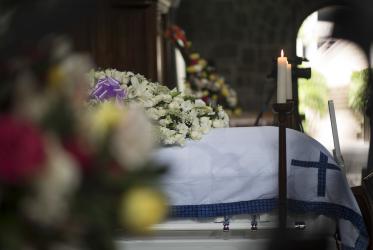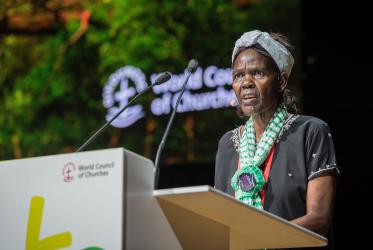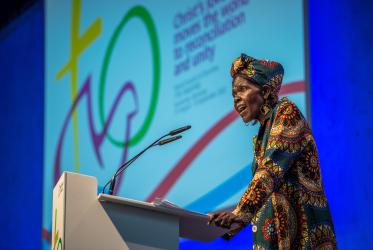“Will thou not revive us again that the people may rejoice in thee?” [Psalm 85:6]
As we gather here in Amsterdam to celebrate the 70-year anniversary of the WCC, people around the world look back with great admiration and appreciation to the vision and resolve of the men and women who established this organization and the subsequent ecumenical movement. This is because the WCC has touched many lives and given voice to the voiceless. The mustard seed planted largely by European and North American churches is now a big tree providing a shade to Christian communities from all the continents.
At the same time, a number of voices can be heard asking whether WCC is still important and relevant, and, if so, how?
These are vital questions and voices to consider in our celebration and as we prepare to move with the future together as one fellowship. May I submit that the landscape of the early 20th century that provided the backdrop for the formation of the WCC may have changed the colours but the content remains the same? Yes there have been changes but some issues have metamorphosed, and some remain the same, though perhaps the location is different.
For example, the war that claimed millions of lives is now raging in the Middle East, Africa etc. A bird’s eye view at our world shows that violence contains unabated including sexual and gender based violence as well as digital violence against children. Militarization and securitization of societies, not least nuclear armaments, threaten human existence. Many a community is experiencing division, fragmentation, hostility as others recycle wounds and trauma because of conflicts. Moreover, human greed is a threat to mother earth and to environmental degradation and climate change. The growth of the church in the Global South is worth thanking God for and as it brings new forms of spiritualities to the fellowship, the church in in the north has to engage with new forms of religious diversity never known before.
Therefore the WCC remains important and relevant today as a place of encounter, dialogue and joint action. One is because the vision of the founders and the prayer of our Lord Jesus for the unity of the church and humankind is yet to be realized. Two, the WCC is an instrument that creates for the churches a way to engage on issues that would otherwise be difficult for individual members [intra-Christian dialogue]; and convening as well as facilitating inter-faith conversations and action on justice and peace as a way of celebrating our heritage of diversity. Third, giving and lifting the credible voices of the people in the margins of our societies.
The relevance and importance of the WCC is captured in the messages of both the Amsterdam and Busan assemblies which state: “We are committed to stay together, and we are committed to move together” as we work for unity, justice and peace. This is a recognition that the WCC and the fellowship as a whole should work and network with others to restore the dignity of every person. It is also a reminder that strategies and methods used in the past 70 years may or may not be appropriate to address present day challenges. Thus the call to move together demands that we are revived, renewed and transformed by the power of the Holy Spirit in ways that respond to the issues of our time and future.
We come to Amsterdam to be revived by God and to draw from the fountain of the wisdom of our ancestors and present day generations so that the people may rejoice as the vision of healing, reconciliation and unity that remains pertinent is rekindled!
Dr Agnes Abuom,
Anglican Church of Kenya
Moderator of the WCC central committee



